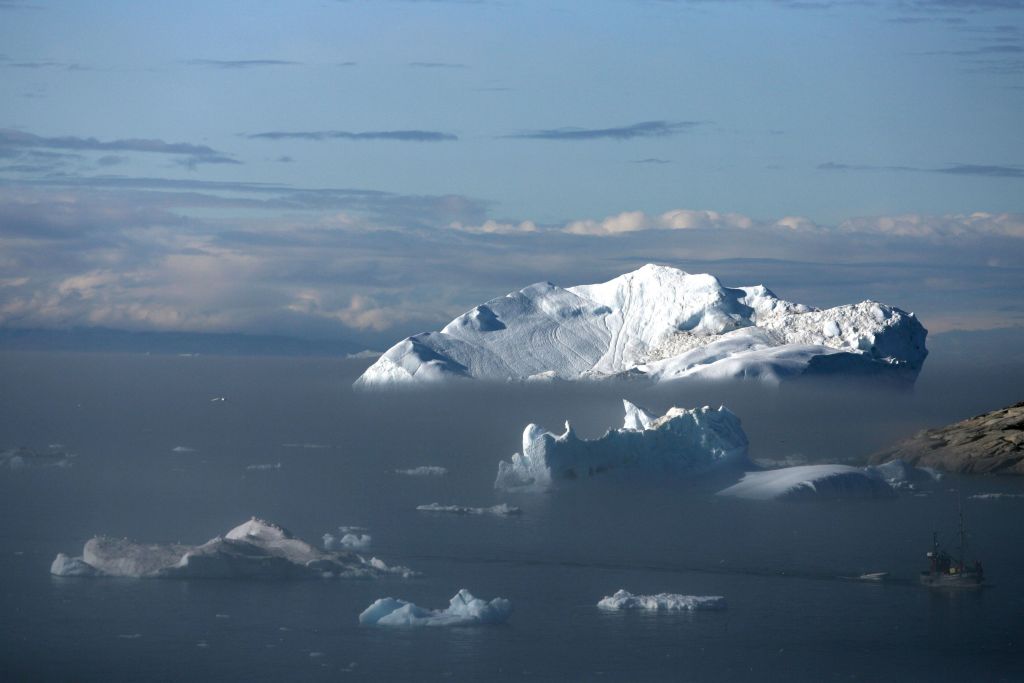New report shows 'extreme and unusual' climate trends from 2016 are continuing in 2017


A free daily email with the biggest news stories of the day – and the best features from TheWeek.com
You are now subscribed
Your newsletter sign-up was successful
The year 2016 saw "extreme and unusual" climate conditions, the World Meteorological Organization says, and they're sticking around.
To put together its State of the Global Climate 2016 report, the WMO looked at research from 80 national weather services. The organization found that in 2016, atmospheric CO2 rose to a new high, Arctic sea ice recorded a new winter low, and the year itself was the warmest on record. Compared to the 1961-1990 average, 2016 was .83 degrees Celsius warmer than average, and .06 degrees Celsius warmer than 2015 — the pervious warmest year on record. In the Arctic, temperatures were about 3 degrees Celsius above the 1961-1990 average.
There were several extreme weather events in 2016, including devastating droughts in southern and eastern Africa and Central America, and Hurricane Mathew, which slammed into Haiti and across the North Atlantic, and this year, the Arctic is experiencing its own severe weather — so far, there have been at least three events that are the equivalent of a heat wave, with warm, moist air being pushed into the region by Atlantic storms. The report also said because of weather changes in the Arctic and the melting of sea ice, there has been a shift in atmospheric circulation patterns, which has led to more than 11,000 warm temperature records being shattered this year in the United States.
The Week
Escape your echo chamber. Get the facts behind the news, plus analysis from multiple perspectives.

Sign up for The Week's Free Newsletters
From our morning news briefing to a weekly Good News Newsletter, get the best of The Week delivered directly to your inbox.
From our morning news briefing to a weekly Good News Newsletter, get the best of The Week delivered directly to your inbox.
President Trump has targeted global warming measures enacted by former President Barack Obama, and the new head of the EPA, Scott Pruitt, has denied that CO2 is a primary contributor to climate change, causing scientists to speak out. "Human-driven climate change is now an empirically verifiable fact, combining year-to-year variability with the consequences of our release of extra greenhouse gases," Dr. Phil Williamson of the University of East Anglia told BBC News. "Those who dispute that link are not skeptics, but anti-science deniers."
A free daily email with the biggest news stories of the day – and the best features from TheWeek.com
Catherine Garcia has worked as a senior writer at The Week since 2014. Her writing and reporting have appeared in Entertainment Weekly, The New York Times, Wirecutter, NBC News and "The Book of Jezebel," among others. She's a graduate of the University of Redlands and the Columbia University Graduate School of Journalism.
-
 6 exquisite homes with vast acreage
6 exquisite homes with vast acreageFeature Featuring an off-the-grid contemporary home in New Mexico and lakefront farmhouse in Massachusetts
-
 Film reviews: ‘Wuthering Heights,’ ‘Good Luck, Have Fun, Don’t Die,’ and ‘Sirat’
Film reviews: ‘Wuthering Heights,’ ‘Good Luck, Have Fun, Don’t Die,’ and ‘Sirat’Feature An inconvenient love torments a would-be couple, a gonzo time traveler seeks to save humanity from AI, and a father’s desperate search goes deeply sideways
-
 Political cartoons for February 16
Political cartoons for February 16Cartoons Monday’s political cartoons include President's Day, a valentine from the Epstein files, and more
-
 Nobody seems surprised Wagner's Prigozhin died under suspicious circumstances
Nobody seems surprised Wagner's Prigozhin died under suspicious circumstancesSpeed Read
-
 Western mountain climbers allegedly left Pakistani porter to die on K2
Western mountain climbers allegedly left Pakistani porter to die on K2Speed Read
-
 'Circular saw blades' divide controversial Rio Grande buoys installed by Texas governor
'Circular saw blades' divide controversial Rio Grande buoys installed by Texas governorSpeed Read
-
 Los Angeles city workers stage 1-day walkout over labor conditions
Los Angeles city workers stage 1-day walkout over labor conditionsSpeed Read
-
 Mega Millions jackpot climbs to an estimated $1.55 billion
Mega Millions jackpot climbs to an estimated $1.55 billionSpeed Read
-
 Bangladesh dealing with worst dengue fever outbreak on record
Bangladesh dealing with worst dengue fever outbreak on recordSpeed Read
-
 Glacial outburst flooding in Juneau destroys homes
Glacial outburst flooding in Juneau destroys homesSpeed Read
-
 Scotland seeking 'monster hunters' to search for fabled Loch Ness creature
Scotland seeking 'monster hunters' to search for fabled Loch Ness creatureSpeed Read
